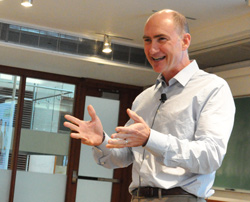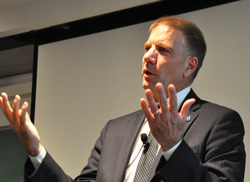‘You Will Have an Adventure’: Lecture Series Spotlights Medical, Robotics Startups
Mechanical engineer Ed Colgate, surgeon David Mahvi speak at second Farley Fellows Seminar
Watch Colgate and Mahvi's presentations.
Entrepreneurship is a wild ride. Ed Colgate should know.
As the cofounder of three robotics startups, Colgate has found himself in some stressful situations — like the time his robotic material handling device started malfunctioning at a trade show the night before attendees were set to arrive. Colgate and his team had to slip past security guards to get onto the trade show floor, then spent all night silently fixing the device while avoiding the guards.
“It’s a rollercoaster,” said Colgate, Allen K. and Johnnie Cordell Breed Senior Professor in Design at Northwestern University’s McCormick School of Engineering and Applied Science, “full of emotional highs and lows.”

Mahvi’s first startup was a learning experience, he said. His product — a probe that treated liver cancer with microwaves — was strong, but the team’s lack of knowledge cost them dearly: after selling their licensing rights, the company’s new owners sold the product to a major medical device manufacturer for $38 million.
“We didn’t know (intellectual property),” Mahvi recalled. “That’s the way life goes.”
Mahvi and his partners maintained more control in their second venture, Medical Engineering Innovations, a company that commercializes new technologies to fight liver cancer with new surgical tools and localized heat treatment. But the development process was slow and costly; after five years, the company is finally putting a product on the market.
While Mahvi’s first venture was not lucrative, there was some benefit to his inexperience: the product was on the market quickly and is now a standard of care.
Naiveté — and the fresh perspective that comes with it — can be a blessing in disguise, he said, noting the success of two students startups he advises. Of course, newbies must seek expertise from professionals who know the field and which problems need solving. “If you have those two ingredients, you’re set,” Mahvi said.

Colgate also emphasized the importance of getting to know your product’s context — your customer base, their needs, and how your product is being used.
Finally, Colgate urged, enjoy the journey.
“You may or may not make $38 million,” he said. “You may or may not get your technology out into the world. But you will have an adventure.”
Colgate and Mahvi are Farley Fellows, entrepreneurship-minded faculty members who advise Northwestern’s Farley Center for Entrepreneurship and Innovation, mentor students and other faculty, and lead by example. All fellows have companies or are involved in substantial entrepreneurial efforts.
The final Farley Fellows talk will be held at 2:30 p.m. on Tuesday, November 12. It will feature Chad Mirkin, George B. Rathmann Professor of Chemistry, Materials Science and Engineering, and (by courtesy) Chemical and Biological Engineering and Biomedical Engineering, and Milan Mrksich, Henry Wade Rogers Professor of Biomedical Engineering, Chemistry, and Cell and Molecular Biology.